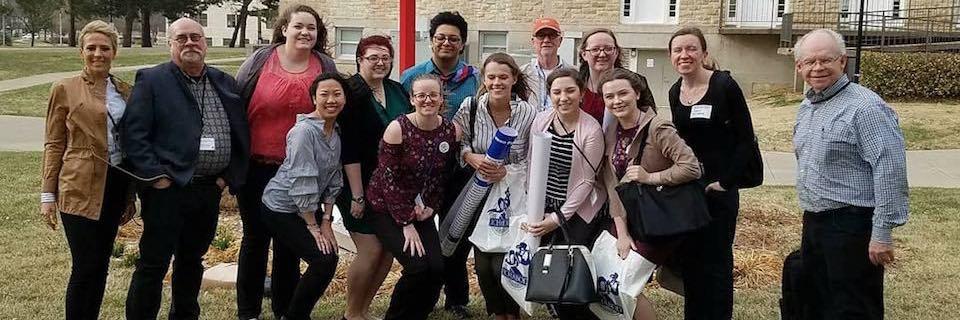Student Teams Take Top Prizes at Great Plains Psychology Conference

Five different student projects from Rockhurst University took prizes for research into everything from the origins of language to student-athlete mindfulness to unconscious bias in perceptions of the police at the most recent Great Plains Student Psychology Convention in Topeka, Kansas, last month.
Of the seven projects presented by Rockhurst students, four took home first-place recognition and another a second-place award as part of the annual conference, hosted by Washburn University last month.
Steve Brown, Ph.D., professor of psychology, said the projects, in many cases, reflect the concerns and interests of the students who made them.
“One of the goals for my experimental methods course is to have students get excited about whatever their subject is,” he said. “I always encourage them to develop their own ideas for what to research.”
For the most part, the students found inspiration for their research in the world and trends they saw around them. One project looked at college students’ perceptions of police officers across different ethnicities and gender types. According to junior psychology major Kristin Van Zandt, who collaborated with fellow students Victoria Gevorkov and Emran Altaf on the project, the research began in Brown’s experimental methods course.
“Police officers have always been a topic on the news and social media, and every person has their own opinion of them, especially about female officers in a male-dominated job,” she said. “I was very interested in seeing people’s perceptions of police officers based only on gender and race alone.”
They conducted research by showing different photos at the nearby University of Missouri Kansas City campus and analyzed the results to support whether police officers were judged differently based on their gender or skin color.
Another group looked at the potential influence of candidate gender on voter perceptions of competence. Maddy Russell, a junior psychology and criminal justice major and one of the group’s two collaborators (alongside Haley Raftery), said the project was inspired largely by recent history.
“We were curious whether or not a voting behavior bias existed among the college population as found in previous research from 10 to 20 years ago,” especially given broader cultural conversations happening now in politics, she said.
Amelia Gardiner, a senior studying psychology and exercise and sport science, said her solo project had a personal connection — one that began before she even started classes at Rockhurst.
“Before my freshman year, I was registering with one of the psychology professors and mentioned that I was interested in sport psychology,” she said.
That day, that professor took her to see Bill Haefele, Ph.D., associate professor of psychology, in whose sport and exercise psychology course she would later enroll and start her project. As an Irish dancer, Gardiner at first focused on the relationship between flow, a state similar to being “in the zone,” and mindfulness in fellow dancers. The project she presented at convention built on that idea, gathering data from 36 different athletes from different sports and analyzing the results to paint a bigger picture about the role flow and mindfulness might play in physical performance. Gardiner, who said she had also presented the first phase of her research to colleagues at the American Psychological Association, said it was more than a chance to practice presenting her research.
“It was a great opportunity to bounce ideas around with professors and students from other universities,” she said.
Those opportunities are a big part of why the psychology faculty members encourage students to take part in and present their undergraduate research. Brown said designing and executing an experiment from start to finish involves many of the skills that benefit students, whether they decide to become faculty members themselves, to enter clinical practice, or user their education in some other field entirely.
“For all of those pathways, having research experience is important,” he said. “In a lot of fields, employers want people who think like scientists and researchers.”
Students honored at the Great Plains Student Psychology Convention include Victoria Gevorkov, Kristin Van Zandt and Emran Altaf, first place, “College Student Attitudes Toward Police Officers: Influence of Officer Gender and Ethnicity”; Haley Raftery and Madeline Russell, first place, “Gender Bias in Voters: The Influence of Candidate Gender on Perceptions of Competence”; Amelia Gardiner, first place, “Flow and Mindfulness in College Athletes”; Kelsey Franklin, first place, “Views of Psychology as a Science: A Comparison Between Psychology Majors and Natural Science Majors”; and Iman Aly, second place, “Origins of Spoken Language: an Evaluation of the Technological Theory of Language.”







